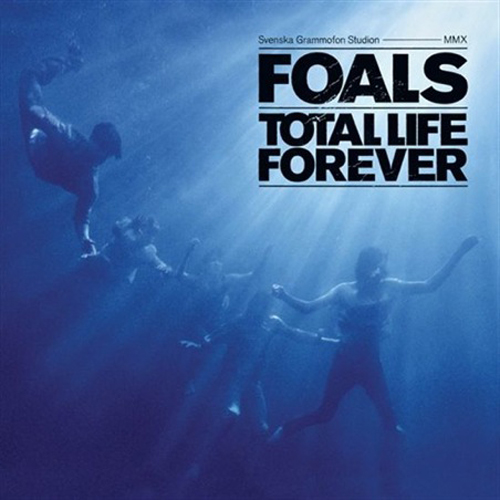It was a little surprising to hear news of a second Foals album two years after the band’s first warmed-over Bloc Party pastiche album underwhelmed everyone into oblivion, but here I am, writing about the new Foals album. Thankfully, they’ve toned down the nerviness and upped the confidence and maturity meter: replacing Sitek’s vacuum-sealed sheen with the warmer and richer production of Clor’s Luke Smith, they’ve returned sound more natural and less affected. The most obvious change is in lead singer Yannis Phillippakis’ vocals, singing in a rich, full-bodied croon instead of the post-punk yelps of debut album Antidotes, more in line with the recent glut of Scottish soft-rock bands like Frightened Rabbit or We Were Promised Jetpacks. With Total Life Forever, Foals attempt to assert their right to exist amidst endless other copycat bands and more importantly why they should stand out, and in some parts they even manage to succeed.
It’s clear from the first few seconds of the album that the band is a much stronger entity than it was the last time around; those new velvety vocals open up the paper-thin “Blue Blood,” a plaintive track that has the band ably exploring slower, more humid climes. If Foals have anything over their soundalike Bloc Party imitators, it’s the one thing that gets them closest to their progenitor: the killer rhythm section. Even the opener pulses with potential energy at its rhythmic core, and the opening stretch of the album is admittedly powerful, with “Blue Blood” careening right into the swung stomp of the fantastic “Miami” before the topsy-turvy title track where the drums and guitars tip-toe around the vocals in short breathless stabs. Unfortunately, from there things get a little more vanilla, the band flailing around lifelessly on the six-minute dirge “Black Gold,” and most fatally ending the album with a stretch of four totally unremarkable tracks, rhythm section be damned.
Opening stretch aside, it’s the warm beating heart of this album that is its true highlight, the ten-minute back-to-back wallop of singles “Spanish Sahara” and “This Orient,” the most fully-realized, idiosyncratic Foals tracks to date where they map out an exciting vision for the future, revealing their true unrealized potential. “Spanish Sahara” is an epic forlorn ballad, barely audible in its opening minutes, with an unforgettable melody and equally affecting vocal from Philippakis; unfortunately, Foals doesn’t seem to realise when to stop and so they drop a huge rhythm over it halfway through, puncturing a gaping hole into the thick air of melodrama they establish and miring the song in the same masculine posturing that affects so much of their music. On the other hand, the more upbeat “This Orient” is a calculated indie rock anthem, wordless vocal chanting, soaring post-rock riffs, interlocking ticking guitars, and high-strung choral vocals, so transparently contrived yet irresistible: just try not to get swept up in its overwrought emotion. Unfortunately, it’s after these two illuminating tracks that the band returns to its old tricks, and the autopilot tracks sound even worse next to these more fully-realized numbers.
For a band apparently obsessed with futurism (see the lyrical content in a few of these songs, notably the choruses of “Black Gold” and “Spanish Sahara”), their sound is unapologetically backward looking, finding strength in derivation and influence rather than forging new ideas or styles. That their remixes are better than their originals says so much: the ideas are there, but the execution is lacking. In Mount Kimbie’s hands, “Spanish Sahara” loses the pointless pounding drums and is given the ornate, floaty atmosphere it deserves. The just-released “This Orient” single is backed with a Starkey remix, who takes away all the neutered pretension and sticks a wheezing thrust behind the vocals, imbuing the sort of skewed power that this band needs instead of hollow moves towards po-faced importance. Foals is a band with untapped potential: they’ve got a solid vocalist, are more than competent at their instruments, and clearly have an ear for melodies, but the way they put their music together remains mostly uninspiring. When they finally branch out, and work with producers as interesting as their remixers: watch out. For now, we’ll just have to deal with a few great songs at a time.

